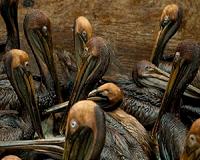| . |  |
. |
East Lansing MI (SPX) Jun 11, 2010 While an out-of-control gusher deep in the Gulf of Mexico fouls beaches and chokes marshland habitat, another threat could be growing below the oil-slicked surface. The nation's worst oil spill could worsen and expand the oxygen-starved region of the Gulf labeled "the dead zone" for its inhospitability to marine life, suggests Michigan State University professor Nathaniel Ostrom. It could already be feeding microbes that thrive around natural undersea oil seeps, he says, tiny critters that break down the oil but also consume precious oxygen. "At the moment, we are seeing some indication that the oil spill is enhancing hypoxia," or oxygen depletion, Ostrom said. "It's a good hint that we're on the right track, and it's just another insult to the ecosystem - people have been worried about the size of the hypoxic zone for many years." The dead zone is believed to stem from urban runoff and nitrogen-based fertilizers from farmland swept into the Gulf by the Mississippi River. Higher springtime flows carry a heavier surge each year, nourishing algae blooms that soon die and sink. Those decay and are eaten by bacteria that consume more oxygen, driving out marine life and killing that which can't move, such as coral. The dead zone can grow to the size of a small state. With the spill overlapping a section of the dead zone, the impact on that region is unknown. As it happened, Ostrom earlier had tapped zoology major Ben Kamphuis to be on the Gulf in late May for a research cruise focused on nitrogen cycling. When the British Petroleum Deepwater Horizon offshore drilling rig blew out and sank April 20, Ostrom and collaborator Zhanfei Liu from the University of Texas at Austin quickly landed federal support to expand their inquiry. Kamphuis, a junior from Holland, Michigan, learned far more than water sampling techniques during his week aboard the research vessel Pelican. "Down there, (the oil spill) really affects a ton of people. I really didn't realize it before going, but after going on the trip I realized how much we can help the people in that area." With dozens of water samples now returned to the lab, Ostrom, Kamphuis and food science sophomore Sam DeCamp, another undergraduate research associate, are setting up equipment to analyze them in the coming months. They want to know whether the oil in the water will promote oxygen starvation, and if so, how. Oil-hungry microbes can be expected to consume more oxygen from the water as they feast on hydrocarbons, Ostrom says. But the oil slick and chemical dispersants also could reduce the flow of oxygen from the atmosphere to the ocean, and possibly reduce the sunlight available to nourish oxygen-producing marine plant life. Financial support for the project came from the National Science Foundation and the MSU College of Natural Science. A jack of many science trades, Ostrom is on faculty in the MSU Department of Zoology and the MSU Environmental Science and Policy Program. He is a biogeochemist who focuses his studies on the interaction of organisms with their chemical and physical environments. Michigan State researchers were in the right place at the right time to contribute to our understanding of the effects of such a massive oil spill, he says, pointing to the oil-eating microbes as likely the biggest, if unrecognized, players in the drama. "We're fortunate to have them," he said. "They're doing the cleanup - not BP."
Share This Article With Planet Earth
Related Links Michigan State University Our Polluted World and Cleaning It Up
 Most oil-struck birds, marine life die alone and uncounted
Most oil-struck birds, marine life die alone and uncountedFort Jackson, Louisiana (AFP) June 10, 2010 Most oil-struck birds and turtles will die alone and uncounted for at sea or buried in coastal wetlands, amid warnings the true toll from the Gulf of Mexico spill may never be known. "Historically, they estimate that 10 percent of (oiled) birds are found," said Rebecca Dunne, of Tri-State Bird Rescue & Research. "Others sink or they're scavenged." Some 1,075 birds - 633 of which we ... read more |
|
| The content herein, unless otherwise known to be public domain, are Copyright 1995-2010 - SpaceDaily. AFP and UPI Wire Stories are copyright Agence France-Presse and United Press International. ESA Portal Reports are copyright European Space Agency. All NASA sourced material is public domain. Additional copyrights may apply in whole or part to other bona fide parties. Advertising does not imply endorsement,agreement or approval of any opinions, statements or information provided by SpaceDaily on any Web page published or hosted by SpaceDaily. Privacy Statement |